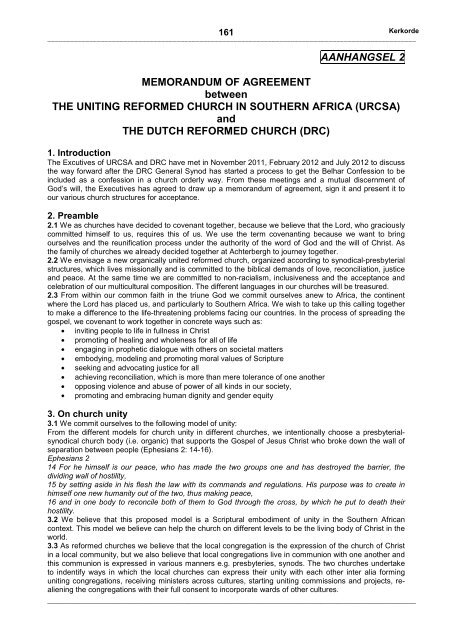You also want an ePaper? Increase the reach of your titles
YUMPU automatically turns print PDFs into web optimized ePapers that Google loves.
161<br />
Kerkorde<br />
_________________________________________________________________________________________________<br />
AANHANGSEL 2<br />
MEMORANDUM OF AGREEMENT<br />
between<br />
THE UNITING REFORMED CHURCH IN SOUTHERN AFRICA (URCSA)<br />
and<br />
THE DUTCH REFORMED CHURCH (DRC)<br />
1. Introduction<br />
The Excutives of URCSA and DRC have met in November 2011, February 2012 and July 2012 to discuss<br />
the way forward after the DRC General Synod has started a process to get the Belhar Confession to be<br />
included as a confession in a church orderly way. From these meetings and a mutual discernment of<br />
God’s will, the Executives has agreed to draw up a memorandum of agreement, sign it and present it to<br />
our various church structures for acceptance.<br />
2. Preamble<br />
2.1 We as churches have decided to covenant together, because we believe that the Lord, who graciously<br />
committed himself to us, requires this of us. We use the term covenanting because we want to bring<br />
ourselves and the reunification process under the authority of the word of God and the will of Christ. As<br />
the family of churches we already decided together at Achterbergh to journey together.<br />
2.2 We envisage a new organically united reformed church, organized according to synodical-presbyterial<br />
structures, which lives missionally and is committed to the biblical demands of love, reconciliation, justice<br />
and peace. At the same time we are committed to non-racialism, inclusiveness and the acceptance and<br />
celebration of our multicultural composition. The different languages in our churches will be treasured.<br />
2.3 From within our common faith in the triune God we commit ourselves anew to Africa, the continent<br />
where the Lord has placed us, and particularly to Southern Africa. We wish to take up this calling together<br />
to make a difference to the life-threatening problems facing our countries. In the process of spreading the<br />
gospel, we covenant to work together in concrete ways such as:<br />
• inviting people to life in fullness in Christ<br />
• promoting of healing and wholeness for all of life<br />
• engaging in prophetic dialogue with others on societal matters<br />
• embodying, modeling and promoting moral values of Scripture<br />
• seeking and advocating justice for all<br />
• achieving reconciliation, which is more than mere tolerance of one another<br />
• opposing violence and abuse of power of all kinds in our society,<br />
• promoting and embracing human dignity and gender equity<br />
3. On church unity<br />
3.1 We commit ourselves to the following model of unity:<br />
From the different models for church unity in different churches, we intentionally choose a presbyterialsynodical<br />
church body (i.e. organic) that supports the Gospel of Jesus Christ who broke down the wall of<br />
separation between people (Ephesians 2: 14-16).<br />
Ephesians 2<br />
14 For he himself is our peace, who has made the two groups one and has destroyed the barrier, the<br />
dividing wall of hostility,<br />
15 by setting aside in his flesh the law with its commands and regulations. His purpose was to create in<br />
himself one new humanity out of the two, thus making peace,<br />
16 and in one body to reconcile both of them to God through the cross, by which he put to death their<br />
hostility.<br />
3.2 We believe that this proposed model is a Scriptural embodiment of unity in the Southern African<br />
context. This model we believe can help the church on different levels to be the living body of Christ in the<br />
world.<br />
3.3 As reformed churches we believe that the local congregation is the expression of the church of Christ<br />
in a local community, but we also believe that local congregations live in communion with one another and<br />
this communion is expressed in various manners e.g. presbyteries, synods. The two churches undertake<br />
to indentify ways in which the local churches can express their unity with each other inter alia forming<br />
uniting congregations, receiving ministers across cultures, starting uniting commissions and projects, realiening<br />
the congregations with their full consent to incorporate wards of other cultures.<br />
_________________________________________________________________________________________________


